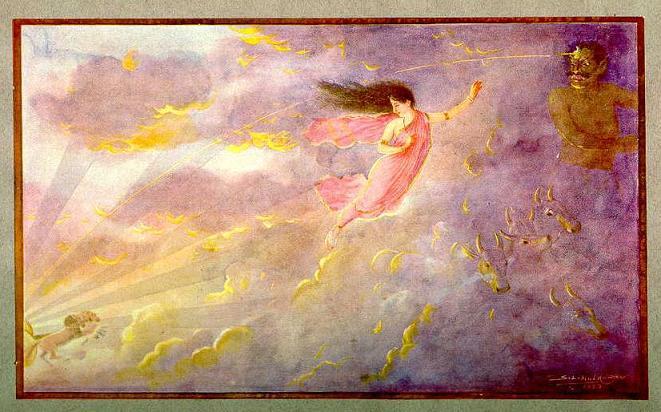srigurubhyO namahA |
Extending the remit of this short section detailing the transience of wealth, the sage gives the disciple the instruction to begin his spiritual quest 'right now'. There is no better time, and it is a matter of great urgency. One must wake up to truth!
*In the last mantra of this sub section, the sage
gives us some last resort instructions! When it is time for one to die, there
is nothing that can be done to prevent it. One’s wealth and power etc or
learning, one’s family and children etc are not capable of stopping the
messengers of death from carrying out their mission – which is separating the
soul from the body. If one has been ignorant of the supreme reality all through
life and has spent it in the pursuit of riches and sensory pleasures, then it
is too late (at the time of death) for commencing yOgic sAdhanA to defeat death. Thus for the ‘average’ layperson
with no spiritual path, his advice is to face death with the name of the Lord
on his lips and His thoughts fixed in the mind. The last line of the verse
suggests that it is only the contemplation of siva at the time of death that
will help one overcome at least the pain and trauma of death. This is perhaps
the next best thing to overcoming death. At least this will enable the jIvA to die with dignity and the focus
of the mind on the supreme principle will orient the passing soul to a future
life which might be more conducive to realising the supreme.
thirucchitrambalam |
Extending the remit of this short section detailing the transience of wealth, the sage gives the disciple the instruction to begin his spiritual quest 'right now'. There is no better time, and it is a matter of great urgency. One must wake up to truth!
உடம்போடு உயிரிடை விட்டோ டும் போது
அடும்பரிசு ஒன்றில்லை அண்ணலை எண்ணும்
விடும்பரி சாய்நின்ற மெய்ந்நமன் தூதர்
சுடும்பரி சத்தையுஞ் சூழகி லாரே. I.3.9.176
அடும்பரிசு ஒன்றில்லை அண்ணலை எண்ணும்
விடும்பரி சாய்நின்ற மெய்ந்நமன் தூதர்
சுடும்பரி சத்தையுஞ் சூழகி லாரே. I.3.9.176
When the
vital spark leaves this mortal mould,
Bribe be none to lure it back; think, think of the Lord;
Death's loyal servants on restless mission bent,
Do nothing consider that with hot breath you pulse. I.3.9.176
Bribe be none to lure it back; think, think of the Lord;
Death's loyal servants on restless mission bent,
Do nothing consider that with hot breath you pulse. I.3.9.176
Com
- When the vital spark leaves this
mortal mould, when it is time for the life force to take leave of this
mortal body Bribe be none to lure it
back; there is nothing to be done that can avoid or overcome death. think, think of the Lord; (at the time
of death) think, contemplate and recite the name of the Lord. Death's loyal servants on restless mission
bent, For the true and loyal messengers of Death are fixed on only one
prize – that of separating the soul and the body. Do nothing consider that with hot breath you pulse. Hence they are
not intent on the prize of tormenting or causing anguish and pain.
thirucchitrambalam |
